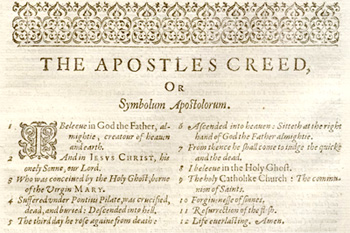
FACT: Everyone Has a Creed!
The question is not whether this church or that church has a creed/confession or not. Rather, the real question is this:
“Is this or that church’s
creed/confession public or private?”
This
is really the only question, because every church, in fact nearly every social
group, will have a certain set of core or fundamental convictions and values
that bind the members together, and which defines what it means to be a member.
Those values and beliefs that unify and have authority over a particular group
serve as that groups “constitution” or better “creed/confession.”
Imagine
if everyone took their anti-creed attitude to the streets! Imagine further how
SCARY it would be if every driver you met on the road had the same attitude,
saying,
I’m
a free spirit! I’m not going to have any set of so-called “safe driving”
conventions and principles determine my driving habits! No! How, when, and at
what speed I drive my car is my personal business! “Drive on the right hand
side,” they say?!? Ha! I’ll show them; I’ll take my half-out of the
middle! Heck, why should I have to share
the road at all?!?
To
look at it another way, think about sports. What if at the next Super Bowl, all
the team members and coaches got together and decided,
Enough
of this smothering “tradition”!! We’ll never be the best players we can be, if
we keep playing according to the traditional understanding of what “football”
means! If we don’t break loose—in this very game—then the sport will never
progress, never move forward.
It’s
always been the same! Tradition has forced us into believing that football is
“a game played between two teams of 11 players each in which the ball is in
possession of one side at a time and is advanced by running or passing.” No
more!! Today, we are going on that field and redefining what football
means! We’ll put out all our
players...or maybe just five. I say we dribble instead of carry the ball. Boys,
if we throw off the old tradition of what football is and means, anything is
possible!!!
That
right! And, if anything is possible, then nothing is possible. If the driving
example were true, no one would have the guts to drive anywhere; it would be
like a war zone! What if the football example were the case? One thing is sure,
whatever they’d be doing out there, hoping to make football some greater thing,
it would no longer be football at all!!!
Thankfully,
whether in driving or sports, people don’t try to apply their anti-creed
attitude most of the time. And, thankfully, despite their anti-creed slogans,
no one pretends to reinvent Christianity
or the meaning of the Bible each and every Sunday! That is because everyone has
a creed/confession that governs their understanding of what it means to be
worshipping as Christians and what the Bible teaches on all the major points of
doctrine.
Do
anti-creed churches reinvent what Christianity means each Sunday? No! Why not,
though?
Because
in reality they have a creed; it’s a private creed rather than a public one. But,
what’s the problem with a creed being private? There are a couple of real problems with
the private creed approach.
(1) If a church’s creed is private, then
it can change without notice. This leads to distrust, uncertainty, and
confusion in a church.
(2)
If a church’s creed is private, then it can never be challenged, because it
isn’t explicitly known.
Whether
it is the Apostles’ Creed, which has been around for almost 1700 years, or it’s
the Heidelberg Catechism, which has been around for over 450 years, these
creeds have had a long career and have served the church through her history.
Being some of the most widely known and confessed documents in the world, they
have also been scrutinized and picked-over for centuries, and have withstood
the challenges of critics, skeptics, and other opponents. So, despite all the
challenges our public creeds have suffered, today with the church all around
the world, we still confess, “Credo,”
“I BELIEVE ...etc.”
No comments:
Post a Comment